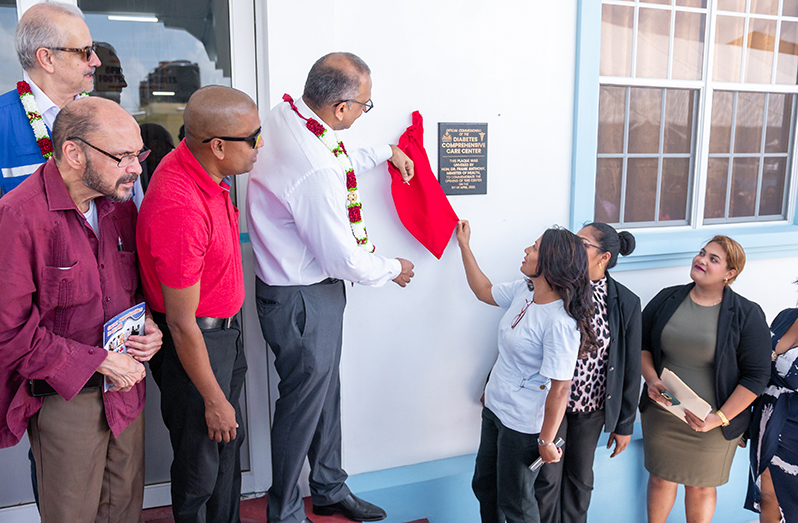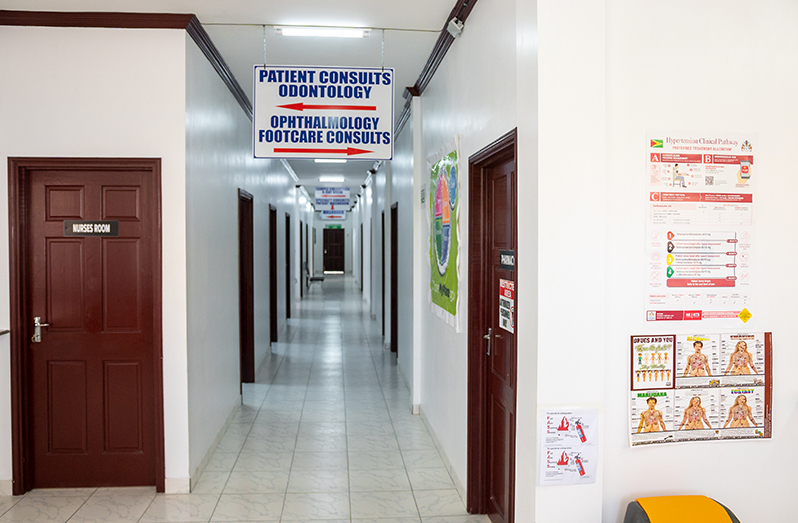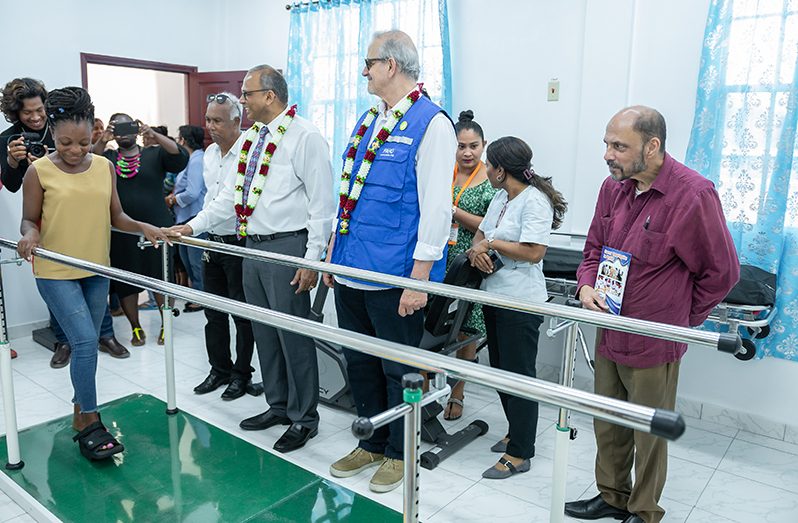-will provide specialist care
IN an effort to tackle the country’s growing chronic diseases issue, the Ministry of Health, on Saturday, opened the first of its kind Diabetes Comprehensive Care Centre at the Lusignan Health Centre, East Coast Demerara.
Over 70 per cent of Guyana’s deaths are attributed to chronic diseases, such as diabetes and the growing number of complications due to its poor management.
This $50 million centre seeks to provide a holistic approach to the care of diabetes patients, providing all services connected to it.
Minister of Health, Dr. Frank Anthony, speaking at the opening ceremony said that the government has been working on this project for a long time given the fact that the prevalence of diabetes in Guyana is a relatively high one.
He noted that most people are unaware that they have the disease because they do not do regular checkups, and only seek medical help when symptoms and complications from the disease become apparent.
“It does not have to be that way because what we need to do is to set up in our primary healthcare system, a better way of diagnosing people early and even getting people into the habit of coming into the health centers for preventative checkups,” the Health Minister said.

Meanwhile, according to Adviser to the Minister of Health, Dr. Leslie Ramsammy, it is estimated that 6,000 people per every 100,000 are affected by diabetes, meaning that more than 50,000 people in Guyana are living with the disease.
But in Guyana’s registry and hospitals, far less than 50,000 people are benefitting from services.
“It means that thousands of people are out there and will only enter the system when damage and disability have already begun. The centre is intended to change this predisposition,” he said.
Director of the National Commission on Disability (NCD), Dr. Lachmie Lall, said that the focus of the centre will be a continuous proactive planned model of care, rather than one that reacts to the acute needs of the individual.
The centre would aim to provide all of the specialist care that is needed to properly manage the diabetic patient and would provide a range of services from foot care management, eye care screening, laboratory testing, heart care management, endocrinology, kidney care, radiology services, dietary counselling, mental health counseling, and physiotherapy therapy and rehabilitative services.
Additionally, the centre will support laboratory testing of all health facilities on the East Coast of Demerara.
“It is our hope that once chronic disease care is initiated at the level of health facilities across the country, and patients are identified and in need of specialty care, they will be referred to this centre,” she said.

Dr. Lall said that the Diabetes Comprehensive Care Centre will also become a hub for continuous training for physicians and healthcare workers across the country.
Family Medicine Specialist, Dr. Indira Bhoj, in giving an overview of diabetes care, said that it is complex for many reasons, as it affects all parts of the human body.
Therefore, the scope of care is one of those conditions that require an informed peer team, an educated client, and the support of the community.
She related that diabetes care revolves around goal setting and achieving targets which require a shift in perspective by patients and practitioners.
“You see, most patients will wait until there’s a symptom before seeking care. The problem with that paradigm is that most complications of diabetes will develop over the course of years in a patient without symptoms,” she explained.
Dr. Bhoj said that instead of care teams waiting for patients to report symptoms, they, unfortunately, end up only diagnosing complications from the disease and not preventing them.
Further, the specialist said that primary care practices have not evolved correspondingly or accordingly, so, the opening of the centre will be a significant initiative to support primary care.
“I believe I speak not only for myself but also for the other doctors placed at this facility; we have a passion for diabetes and we are driven to support primary care. Once again, goal setting is one of the main principles of diabetes care. Goals for blood pressure, blood sugar, body weight, medication adherence, exercise, and nutrition,” she related.
She said that an urgent shift is required in the way primary care delivers diabetes care.
“We have the opportunity here to provide preventative foot care to high-risk patients, fostering good foot care practices and offering procedures such as pressure offloading and nail care, thereby preventing the ulcers as well as their recurrence,” she said.
Likewise, disability due to blindness is highly preventable as well, Dr. Bhoj explained.
“Retinal laser treatments are very effective in the early stages of diabetic eye disease. That is in the stages when patients may not even detect a change in their vision,” she said.
Bhoj added: “Cardiovascular risk assessment tools are readily available to anyone with an Internet connection and is a required standard of care for all patients with diabetes from the moment of diagnosis to reduce the risks of strokes and heart attacks.”
Further, she said that the responsibility is on the primary care team to identify each patient’s risk and develop risk reduction plans.
“We start off today at this centre collaborating with the Georgetown Public Hospital to be able to offer the range of services to support primary care in improving the usual standard of care. Our specialists at this point will be visiting from the Georgetown hospital.”
She said that educating the patients will be a main activity for their team, given the context of limited health literacy, counselling, coaching, and making good use of the medicines and resources already in the system.
“We have a good opportunity to start off on the right foot by capturing the newly diagnosed patients with diabetes and preparing them for living a healthy life with diabetes.”


.jpg)











